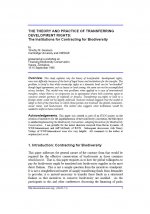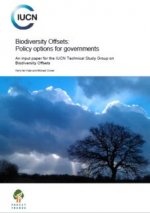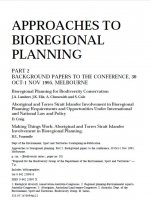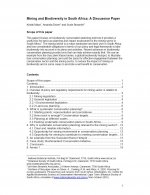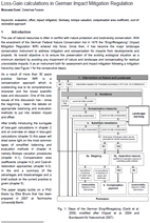The Theory and Practice of Transferring Development Rights: The Institutions for Contracting for Biodiversity
Timothy SwansonThis study explains why the theory of transferable development rights, runs into difficulty because of the lack of legal bases and institutions for the transfer. The problem, in brief is that while ownership rights at a domestic level can be “un-bundled” though legal agreements such as leases or land zoning, the same can not be […]
Guidance Notes to the Standard on Biodiversity Offsets
BBOPThese Guidance Notes to the Standard on Biodiversity Offsets (the Standard) have been prepared by the Business and Biodiversity Offsets Programme (BBOP) to help auditors, developers, conservation groups, communities, governments and financial institutions that wish to assess biodiversity offsets against the Standard on Biodiversity Offsets.
Biodiversity Offsets: Policy options for governments
An input paper for the IUCN Technical Study Group on Biodiversity Offsets
Kerry ten Kate, Michael Crowe - Forest TrendsThe purpose of this paper is to contribute to the consideration of policy options by the IUCN Technical Study Group on biodiversity offsets and the subsequent Working Group, and to provide information more broadly to governments and their advisors. It is intended as a basic introduction to policy on No Net Loss (NNL) or a […]
Environmental Offsets: Position Statement No 9, Version 2
Government of AustraliaThe task of developing bioregional planning processes which will protect biodiversity is part of Australias commitment towards a society based on principles of ecologically sustainable development (ESD). There is a wide spectrum of views about how such a society might be established, and the Federal Government is endeavouring to find a path between these, without […]
Upper South East Dryland Salinity and Flood Management Project Update
Government of AustraliaThe Upper South East is now poised to benefi t from a very signifi cant investment from the National Action Plan for Salinity and Water Quality (NAP). More than $38 million from the Australian and State Governments, along with landholder contributions will have a huge impact on salinity and fl ood management in the region.
Mining and Biodiversity in South Africa: A Discussion Paper
Kristal Maze, Susie Brownlie, Amanda DriverThis paper focuses on biodiversity conservation planning and how it provides a useful tool for land-use planning and impact assessment in the mining sector in South Africa. The mining sector is a major landowner and land user in South Africa, and has considerable obligations in terms of our policy and legal framework to take biodiversity […]
Carbon Forestry Projects in Developing Countries: Legal Issues and Tools
Patsy DavisIncreasing awareness of the need for action on global warming has produced a search for ways to reduce greenhouse gas (GHG) emissions and to sequester carbon to offset such emissions. At the present time nations around the globe are hotly debating whether to put into force the Kyoto Protocol, a climate control regime that mandates […]
Loss-Gain calculations in German Impact Mitigation Regulation
MARIANNE DARBI - CHRISTIAN TAUSCHAs a result of more than 30 years practice German IMR is a compensation approach which is outstanding due to its comprehensive character and the broad scientific base and discussion. One of the core issues of this discussion has – since the beginning – been the debate on appropriate balancing and evaluation methods to put […]
Key ingredients for Biodiversity Offsets to Achieve No Net Loss
Dr. Amrei von Hase, Dr. Toby GardnerTo ensure that offsets contribute effectively towards reconciling development and conservation and achieving no net loss of biodiversity, it is essential to have a clear understanding of the key ingredients are for meeting this goal. This guidance document reviews the key conditions and considerations that underpin no net loss. A conceptual framework and decision-making process […]
BBOP Standard (Portuguese Translation)
BBOPPortuguese Translation of BBOP Standard


